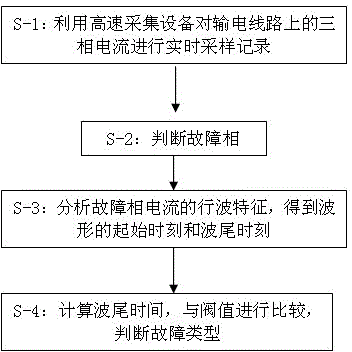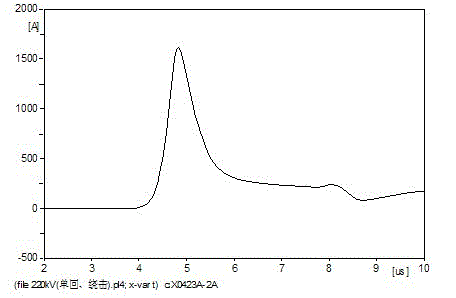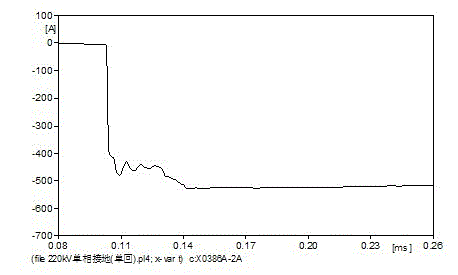Method for identifying lightning stroke fault and non-lightning stroke fault of transmission line
A lightning strike fault and transmission line technology, applied in the fault location, measuring electrical variables, measuring current/voltage, etc., can solve the problems of line load current, line length and transition resistance, which are not easy to implement, and affect the reliability of transmission lines. , to achieve the effect of simple and easy-to-implement waveform analysis and judgment process
- Summary
- Abstract
- Description
- Claims
- Application Information
AI Technical Summary
Problems solved by technology
Method used
Image
Examples
Embodiment Construction
[0019] see figure 1 , figure 1 It is a flow chart of steps in an embodiment of a method for distinguishing lightning strike faults and non-lightning strike faults of transmission lines based on high-frequency traveling wave currents in the present invention.
[0020] The identification method includes the following steps:
[0021] S-1, Real-time sampling and recording: install high-speed acquisition equipment to conduct real-time sampling and recording of the three-phase transient current on the transmission line;
[0022] In this step, a high-speed sampling device with a sampling frequency of 10 MHz is used to sample and record the current on the transmission line in real time to obtain the three-phase transient current of the transmission line.
[0023] S-2, judge the fault phase;
[0024] In this step, compare the maximum magnitude of the three-phase transient current recorded at the same observation point ,and , the one with the largest amplitude is the fault phase;...
PUM
 Login to View More
Login to View More Abstract
Description
Claims
Application Information
 Login to View More
Login to View More - R&D
- Intellectual Property
- Life Sciences
- Materials
- Tech Scout
- Unparalleled Data Quality
- Higher Quality Content
- 60% Fewer Hallucinations
Browse by: Latest US Patents, China's latest patents, Technical Efficacy Thesaurus, Application Domain, Technology Topic, Popular Technical Reports.
© 2025 PatSnap. All rights reserved.Legal|Privacy policy|Modern Slavery Act Transparency Statement|Sitemap|About US| Contact US: help@patsnap.com



